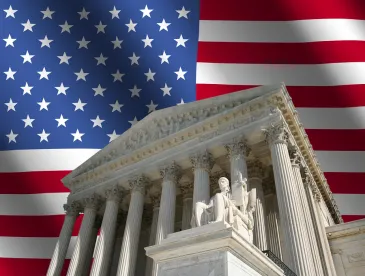Since the death of Associate Justice Antonin Scalia of the Supreme Court of the United States, the political world has been waiting—through a failed nomination of a successor, a presidential campaign and election, and the controversial first weeks of a new administration—for a new justice to take his or her place on the Court. Almost one year after Scalia’s death in February of 2016, the wait may soon be over. On the morning of January 30, 2017, President Donald Trump announced that he had decided whom he would nominate to fill the vacancy on the Supreme Court. In anticipation of an announcement on January 31, here is a short list of potential nominees whom insiders and the media believe have a chance of being named.
1. Neil M. Gorsuch
Neil McGill Gorsuch is currently a judge on the U.S. Court of Appeals for the Tenth Circuit. He was nominated to the Tenth Circuit by President George W. Bush in May of 2006. During his legal career, Gorsuch clerked for Supreme Court justices Bryon White and Anthony Kennedy. He was later in private practice after which he worked at the U.S. Department of Justice as a principal deputy to the Associate Attorney General.
Gorsuch, who was a Marshall Scholar at the University of Oxford where he obtained a doctoral degree, is widely considered to be, like Scalia, both a judicial originalist (a proponent of interpreting the Constitution in the context of the time in which it was written) and a textualist. He is also often compared to Scalia for his precise and well-written—and often entertaining—opinions.
2. William H. Pryor Jr.
William Holcombe “Bill” Pryor Jr. is a judge on the U.S. Court of Appeals for the Eleventh Circuit, currently serving as a visiting professor at the University of Alabama School of Law and as an adjunct professor at the Cumberland School of Law at Samford University. He also serves on the United States Sentencing Commission. After law school, Pryor was a clerk for Judge John Minor Wisdom of the U.S. Court of Appeals for the Fifth Circuit. After his clerkship, he worked in private practice and as an adjunct professor.
Some have called this Alabama-based judge the most extremist or polarizing of all the potential nominees. He notably called the Roe v. Wade decision ”the worst abomination of constitutional law in our history.” He also wrote a brief in support of the Texas law in the Supreme Court case, Lawrence v. Texas, commenting that “states should remain free to protect the moral standards of their communities through legislation that prohibits homosexual sodomy.”
3. Thomas M. Hardiman
Thomas M. Hardiman is a judge on the U.S. Court of Appeals for the Third Circuit. After finishing law school, Hardiman practiced law for various firms for over 10 years. In 2003, President George W. Bush nominated him to the U.S. District Court of the Western District of Pennsylvania. President Bush later nominated him to fill a Third Circuit vacancy and in 2007, the U.S. Senate confirmed him.
If confirmed, Hardiman would be the only Supreme Court justice who did not attend an Ivy League school. The former cab driver has a notably blue collar background, being the first in his family to graduate from college.
4. Diane S. Sykes
Diane S. Sykes is a judge on the U.S. Court of Appeals for the Seventh Circuit. After clerking for Judge Terence T. Evans at the U.S. District Court for the Eastern District of Wisconsin, Sykes worked in private practice and was later elected as a judge to the Milwaukee County Circuit Court. In 1999, she was appointed to the Wisconsin Supreme Court. President George W. Bush nominated Sykes to the Seventh Circuit in 2003, and the U.S. Senate confirmed her nomination in 2004.
A self-described “originalist-textualist,” Sykes is probably best known for authoring the majority opinion in Korte v. Sebelius, in which she ruled in favor of two Catholic businesses that objected to the Affordable Care Act’s contraceptive mandate.
In March of 2016, President Obama nominated Merrick Garland, who is currently chief judge of the U.S. Court of Appeals for the District of Columbia Circuit, to serve as an associate justice of the Supreme Court. At the time, the Senate (under Senate Majority Leader Mitch McConnell) did not hold hearings on the nomination. Seemingly with those events in mind, Senator Jeff Merkley (D-OR) commented, “This is a stolen seat. This is the first time a Senate majority has stolen a seat.” Some Senate Democrats are already promising to filibuster any Supreme Court nominee, meaning that Trump’s pick would need 60 votes to be confirmed. With Merkley promising that Democrats “will use every lever in our power to stop this,” the controversy over Garland’s nomination looms large as we await Trump’s selection.




 />i
/>i


